Mises, Ludwig von. Human Action: A Treatise on Economics
Подождите немного. Документ загружается.

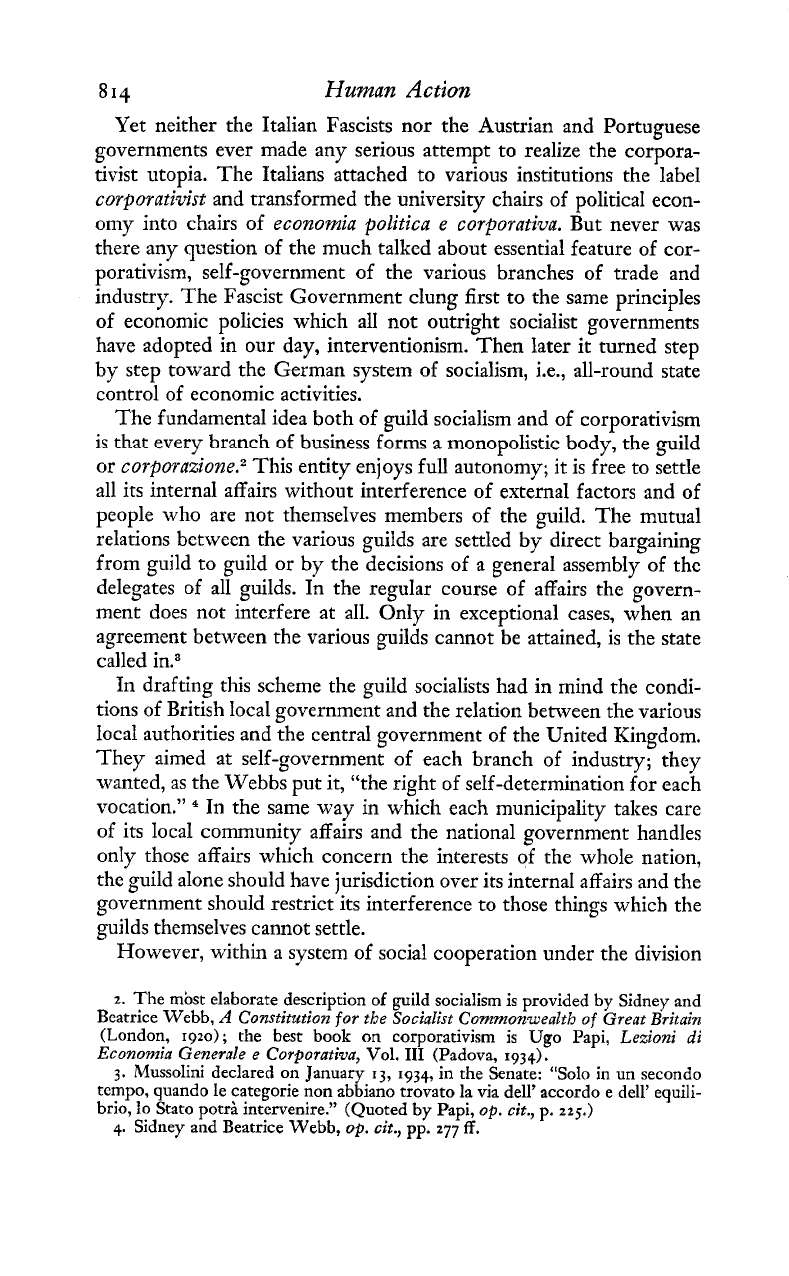
8x4
Human
Action
Yet neither the Italian Fascists nor the Austrian and Portuguese
governments ever made any serious attempt to realize the corpora-
tivist utopia. The Italians attached to various institutions the label
corporativirt
and transformed the university chairs of political econ-
omy into chairs of
economia politica
e
corporativa.
But never was
there any question of the much talked about essential feature of cor-
porativism, self-government of the various branches of trade and
industry. The Fascist Government clung first to the same principles
of economic policies which all not outright socialist governments
have adopted in our day, interventionism. Then Iater it turned step
by step toward the German system of socialism, i.e., all-round state
control of economic activities.
The fundamental idea both of guild socialism and of corporativism
is that every branch of business forms a monopolistic body, the guild
or
co~porazione.~
This entity enjoys full autonomy; it is free to settle
all its internal affairs without interference of external factors and of
people who are not themselves members of the guild. The mutual
relations between the various guilds are settled by direct bargaining
from guild to guild or by
the
decisions of
a
general assembly of the
delegates of all guilds. In the regular course of affairs the govern-
ment does not interfere
at
all. Only in exceptional cases, when an
agreement between the various guilds cannot be attained, is the state
called in.3
In drafting this scheme the guild socialists had in mind the condi-
tions of British local government and the relation between the various
local authorities and the central government of the United Kingdom.
They aimed at self-government of each branch of industry; they
wanted, as the Webbs put it, "the right of self-determination for each
vocation."
In the same way in which each municipality takes care
of its local community affairs and the national government handles
only those affairs which concern the interests of the whole nation,
the guild alone should have jurisdiction over its internaI affairs and the
government should restrict its interference to those things which the
guilds themselves cannot settle.
However, within a system of social cooperation under the division
z.
The most elaborate description of guild socialism is provided by Sidney and
Beatrice Webb,
A
Constitution for the Socialist Commonwealth of Great Britain
(London,
1920);
the best book on corporativism is Ugo Papi,
Lezioni
di
Economia Generale e Corporativa,
Vol.
I11
(Padova,
1934).
3.
Mussolini declared on January
13,
1934,
in the Senate: "Solo in un second0
tempo, quando le categorie non abbiano trovato la via dell' accord0 e dell' equili-
brio, lo Stato potrh intervenire." (Quoted by Papi,
op.
cit.,
p.
225.)
4.
Sidney and Beatrice Webb,
op.
cit.,
pp.
277
ff.
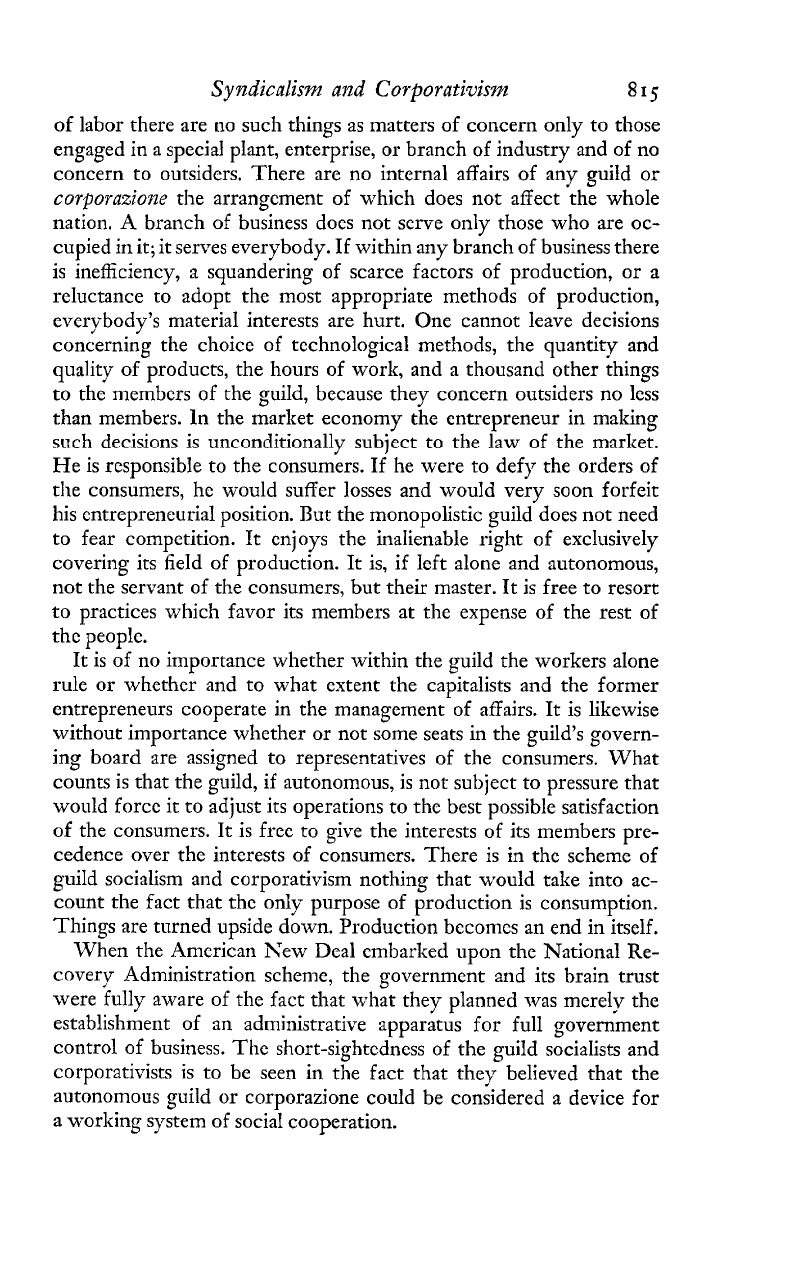
Syndicalism
and
Corporativism
815
of labor there are no such things as matters of concern only to those
engaged in a special plant, enterprise, or branch of industry and of
no
concern to outsiders. There are no internal affairs of any guild or
corporazione
the arrangement of which does not affect the whole
nation.
A
branch of business does not serve only those who are oc-
cupied in it; it serves everybody. If within any branch of business there
is inefficiency, a squandering of scarce factors of production, or
a
reluctance to adopt the most appropriate methods of production,
everybody's material interests are hurt. One cannot leave decisions
concerning the choice of technological methods, the quantity and
quality of products, the hours of work, and a thousand other things
to the members of the guild, because they concern outsiders no less
than members. In the market economy the entrepreneur in making
such decisions is unconditionally subject to the law of the market.
He is responsible to the consumers. If he were to defy the orders of
the consumers, he would suffer losses and would very soon forfeit
his entrepreneurial position. But the monopolistic guild does not need
to fear competition. It enjoys the inalienable right of exclusively
covering its field of production. It is, if left alone and autonomous,
not the servant of the consumers, but their master. It is free to resort
to practices which favor its members at the expense of the rest of
the people.
It is of no importance whether within the guild the workers alone
rule or whether and to what extent the capitalists and the former
entrepreneurs cooperate in the management of affairs. It is likewise
without importance whether or not some seats in the guild's govern-
ing board are assigned to representatives of the consumers. What
counts
is
that the guild, if autonomous, is not subject to pressure that
would force it to adjust
its
operations to the best possible satisfaction
of the consumers. It is free to give the interests of its members pre-
cedence over the interests of consumers. There is in the scheme of
guild socialism and corporativism nothing that would take into ac-
count the fact that the only purpose of production is consumption.
Things are turned upside down. Production becomes an end in itself.
When the American New Deal embarked upon the National Re-
covery Administration scheme, the government and its brain trust
were fully aware of the fact that what they planned was merely the
establishment of an administrative apparatus for full government
control of business. The short-sightedness of the guild socialists and
corporativists is to be seen
in
the fact that they believed that the
autonomous guild or corporazione could be considered a device for
a working system of social cooperation.
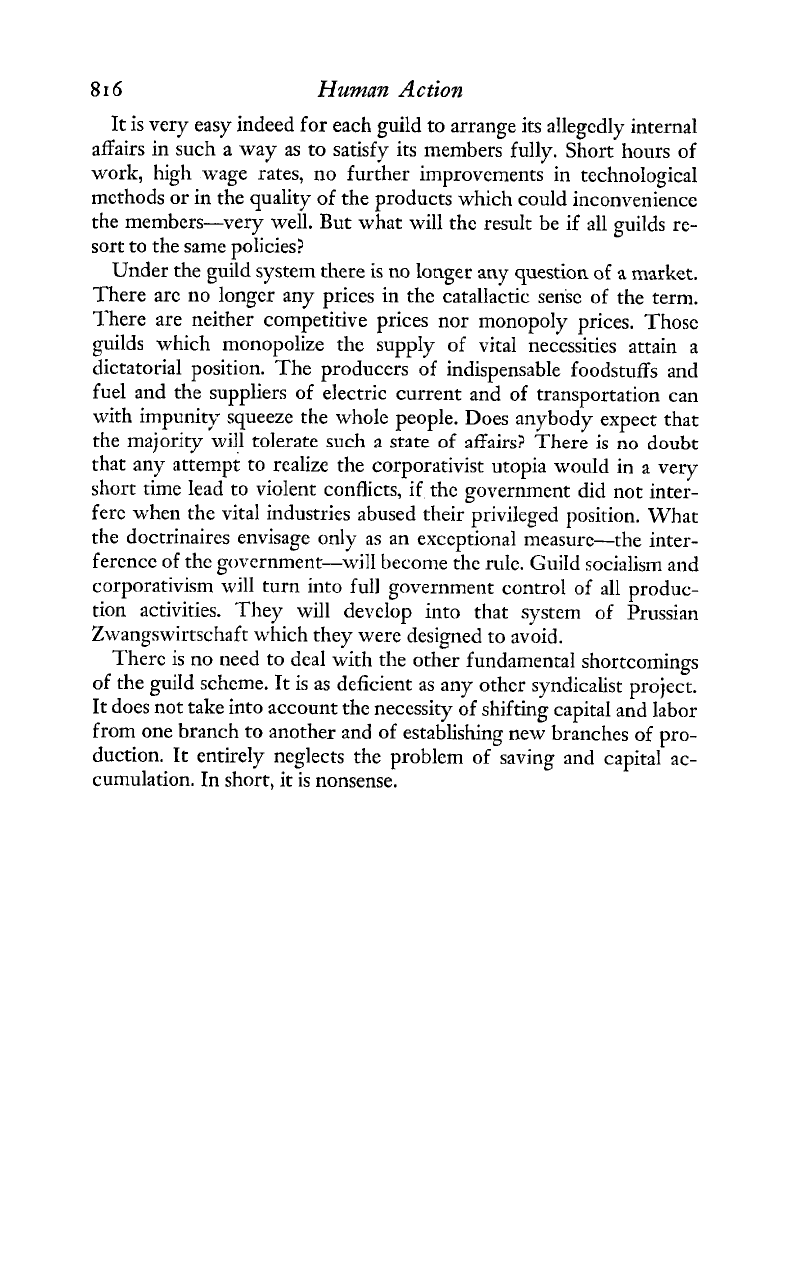
816
Human
Action
It is very easy indeed for each guild to arrange its allegedly internal
affairs in such a way
as
to satisfy its members fully. Short hours of
work, high wage rates, no further improvements in tcchnoIogica1
methods or in the quality of the products which could inconvenience
the members-very well. But what will the result be if all guilds re-
sort to the same policies?
Under the guild system there is no longer
any
question of
a
market.
There are no longer any prices in the catalIactic setise of the term.
There are neither competitive prices nor monopoly prices. Those
guilds which monopolize the suppIy of vital necessities attain a
dictatorial position. The producers of indispensable foodstuffs and
fuel and the suppliers of electric current and of transportation can
with impunity squeeze the whole people. Does anybody expect that
the majority will tolerate such
a
state of affairs? There is no doubt
that any attempt to realize the corporarivist utopia would in a very
short time lead to violent conflicts, if the government did not inter-
fere when the vital industries abused their privilcged position. What
the doctrinaires envisage only as an exceptional measure-the inter-
ference of the government-will become the rule. Guild socialism and
corporativism will turn into full government control of all produc-
tion activities. They will develop into that system of Prussian
Zwangswirtschaft which they were designed to avoid.
There is no need to deal with the other fundamental shortcomings
of the guild scheme. It is as deficient as any other syndicalist project.
It does not take into account the necessity of shifting capital and labor
from one branch to another and of establishing new branches of pro-
duction.
It
entirely neglects the problem of saving and capital ac-
cumulation. In short, it is nonsense.
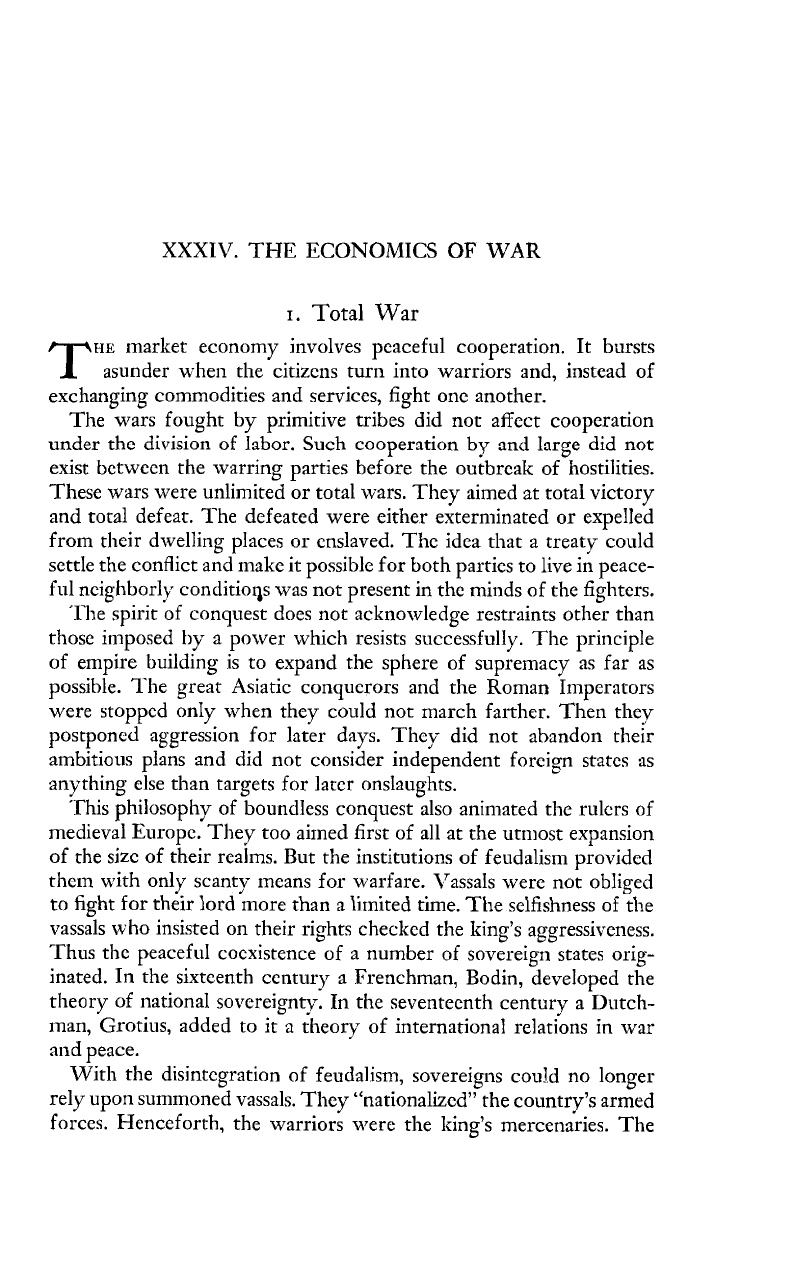
XXXIV. THE ECONOMICS OF
WAR
I.
Total War
T
HE
market economy involves peaceful cooperation. It bursts
asunder when the citizens turn into warriors and, instead of
exchanging commodities and services, fight one another.
The wars fought by primitive tribes did not affect cooperation
under the division of labor. Such cooperation by and large did not
exist between the warring parties before the outbreak of hostilities.
These wars were unlimited or total wars. They aimed at total victory
and total defeat. The defeated were either exterminated or expelled
from their dwelling places or enslaved. The idea that a treaty could
settle the conflict and make it possible for both parties to live in peace-
ful
neighborly
conditioqs was not present in the minds of the fighters.
'1-he spirit of conquest does not acknowledge restraints other than
those imposed by
a
power which resists successfully. The principle
of empire building is to expand the sphere of supremacy as far as
possible. The great Asiatic conquerors and the Roman Imperators
were stopped onIy when they could not march farther. Then they
postponed aggression for later days. They did not abandon their
ambitious plans and did not consider independent foreign states as
anything else than targets for later onslaughts.
'This philosophy of boundless conquest also animated the rulers of
medieval Europe. They too aimed first of all at the utn~ost expansion
of the size of their reajms. But the institutions of feudalism provided
than with only scanty means for warfare. lTassals were not obliged
to fight for their lord more than
a
limited time. The selfishness of the
vassals who insisted on their rights checked the king's aggressiveness.
Thus the peaceful coexistence of a number of sovereign states orig-
inated. In the sixteenth century a Frenchman, Bodin, developed the
theory of national sovereignty. In the seventeenth century a Dutch-
man, Grotius, added to it
a
theory of international relatibns in war
and peace.
With the disintegration of feudalism, sovereigns could no longer
rely upon summoned vassals. They "nationalized" the country's armed
forces. Henceforth, the warriors were the Icing's mercenaries. The
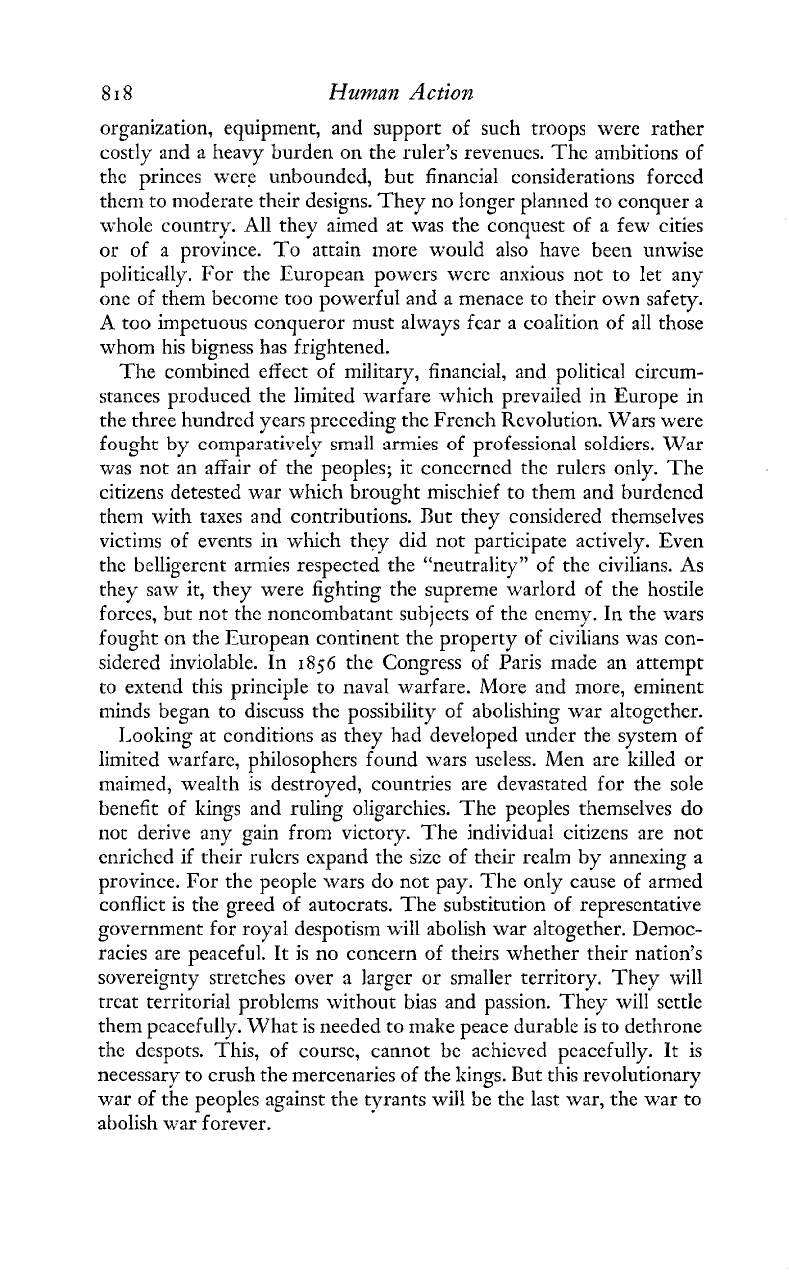
8
I
8
Human
Action
organization, equipment, and support of such troops were rather
costly and a heavy burden on the ruler's revenues. Thc ambitions of
the princes were unbounded, but financial considerations forced
them to moderate their designs. They no longer planned to conquer a
whole country. All they aimed at was the conquest of a fcw cities
or of a province. To attain more would also have been unwise
politically. For the European powers were anxious not to let any
one of them become too powerful and a menace to their own safety.
A
too impetuous conqueror must always fear a coalition of all those
whom his bigness has frightened.
The combined effect
of
military, financial, and political circum-
stances produced the limited warfare which prevailed in Europe in
the three hundred years preceding the French Revolution. Wars were
fought by comparatively small armies of professional soldiers. War
was not in affair of the peoples; it concerned the rulers only. The
citizens detested war which brought mischief to them and burdened
them with taxes and contributions. But they considered themselves
victims of events in which they did not participate actively. Even
the belligerent armies respected the "neutrality" of the civilians. As
they saw it, they were fighting the supreme warlord of the hostile
forces, but not the noncombatant subjects of the enemy. In the wars
fought on the European continent the property of civilians was con-
sidered inviolable. In
1856
the Congress of Paris made an attempt
to extend this principle to naval warfare. More and more, eminent
minds began to discuss the possibility of abolishing war altogether.
Looking at conditions as they had developed under the system of
limited warfare, philosophers found wars useless. Men arc killed or
maimed, wealth is destroyed, countries are devastated for the sole
benefit of Icings and ruling oligarchies. The peoples themselves do
not derive any gain from victory. The individual citizens are not
enriched if their rulers expand the size of their realm by annexing a
province. For the people wars do not pay. The only cause of armed
conflict is the greed of autocrats. The substitution of representative
government for royal despotism will abolish war altogether. Democ-
racies are peaceful. It is no concern of theirs whether their nation's
sovereignty stretches over
a
larger or smaller territory. Thev will
treat territorial problems without bias and passion.
hey
wili scttle
them peacefully. What is needed to make peace durable is to dethrone
the despots. This, of course, cannot bc achieved peacefully. It is
necessary to crush the mercenaries of the kings. But this revolutionary
war of the peoples against the tyrants will bc the last war, thc war to
abolish war forever.
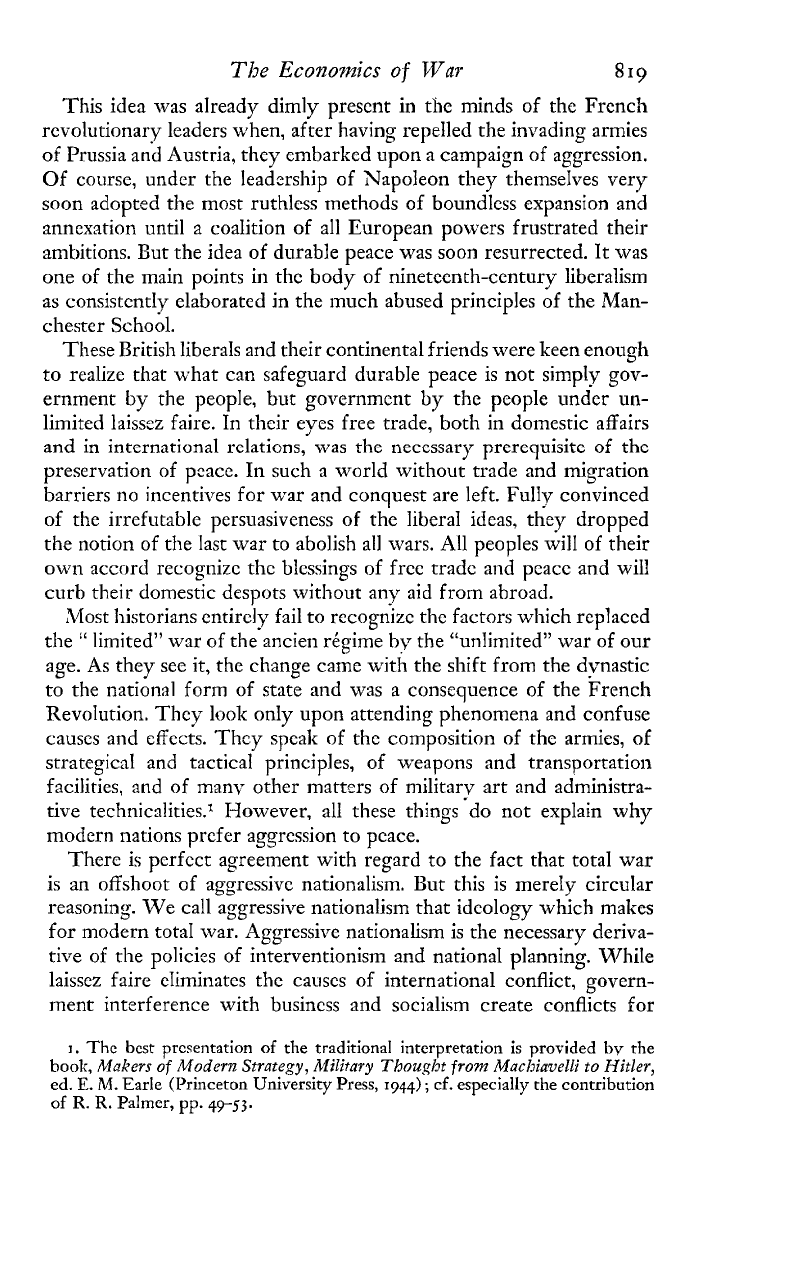
The
Econo~nics
of
War
This idea was already dimly present in the minds of the French
revolutionary leaders when, after having repelled the invading armies
of Prussia an2 Austria, they embarked upon a campaign of aggression.
Of course, under the leadership of Napoleon they themseIves very
soon adopted the most ruthless methods of boundless expansion and
annexation until a coalition of all European powers frustrated their
ambitions. But the idea of durable peace was soon resurrected. It was
one of the main points in the body of nineteenth-century liberalism
as consistently elaborated in the much abused principles of the Man-
chester school.
These British liberals and their continental friends were keen enough
to realize that what can safeguard durable peace is not simply gov-
ernment by the people, but government by the people under un-
limited laissez faire. In their eyes free trade, both in domestic affairs
and in international relations, was the necessary prerequisite
of
the
preservation of pcace. In such a world without trade and migration
barriers no incentives for war and conquest are left. Fullv convinced
of the irrefutable persuasiveness of the liberal ideas, they dropped
the notion of the last war to abolish all wars. All peoples will of their
own accord recognize the blessings of free trade and peace and will
curb their domestic despots without any aid from abroad.
Adost historians entirely fail to recogn& the factors which replaced
the
"
limited" war of the-ancien rCgime bv the "unlimited" war of our
age. As they see it, the change came with the shift from the dvnastic
to the national form of state and was a consequence of the ~rench
Revolution. They look only upon attending phenomena and confuse
causes and effects. They speak of the composition of the armies, of
strategical and tactical principles, of weapons and transportation
facilities, and of manv other mattcrs of military art and administra-
tive technicalities.' Nowever, all these things do not explain why
modern nations prefer agsression to pcace.
Therc is pcrfcct agreement with regard to the fact that total war
is an offshoot of aggressive nationalism. But this is merely circular
reasoning. We call a&essive nationalism that ideology which makes
for modern total war. Aggressive nationalism is the necessary deriva-
tive of the policies of interventionism and national planning. While
laissez faire eIiminates the causes of international conflict, govern-
ment interference with business and socialism create conflicts for
I.
The
best presentation of the traditional interpretation is provided
bv
the
book,
Makers of Modern Strategy, Military Thought from Machiavelli to Hitler,
ed.
E.
M.
Earle (Princeton University Press,
1944);
cf. especially the contribution
of
R.
R.
Palmer, pp.
49-53.
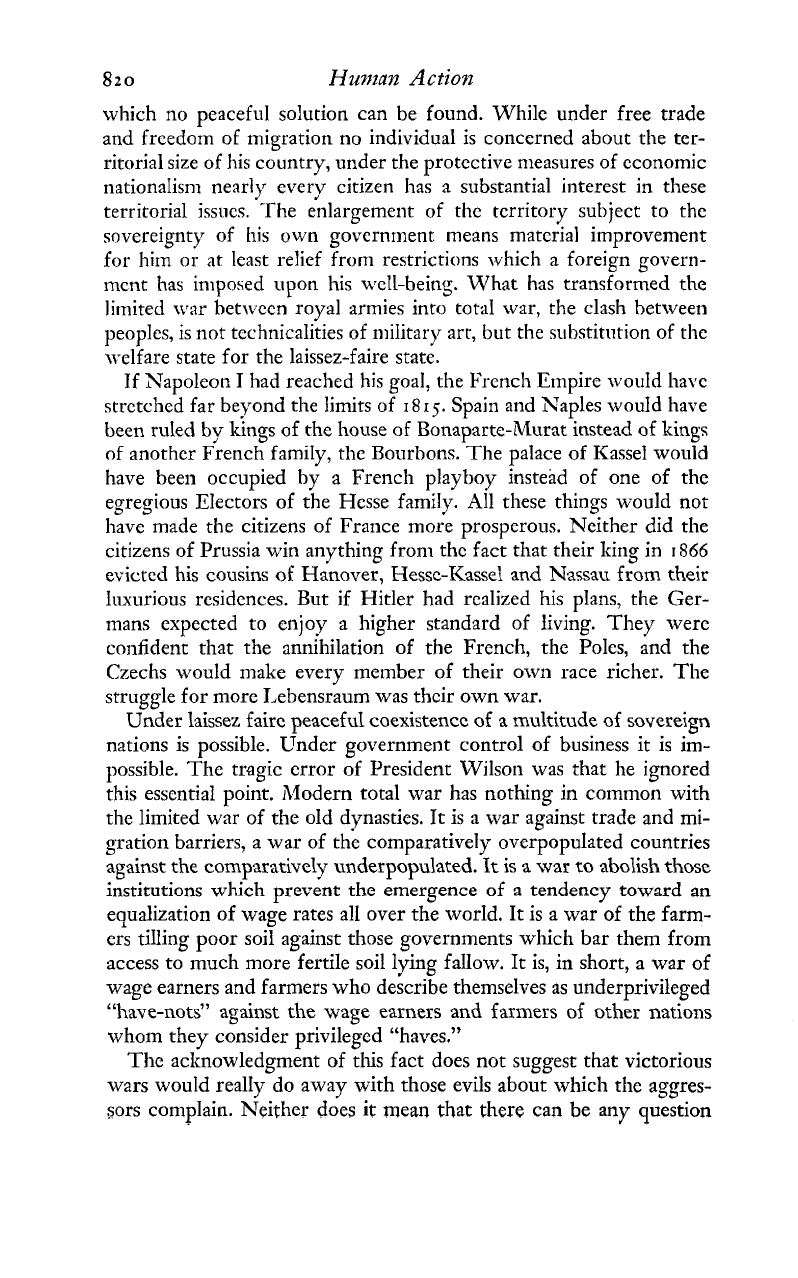
820
Human
Action
which no peaceful solution can be found. While under free trade
and freedom of migration no individual is concerned about the ter-
ritorial size of his country, under the protective measures of economic
nationaIism nearly every citizen has a substantial interest in these
territorial jssucs. The enlargement
of
the territory subject to the
sovereignty of
his
own government means material improvement
for him or at least relief from restrictions which a foreign govern-
ment has imposed upon his wcll-being. What has transformed the
limited war betnecn royal armies into total war, the clash between
peoples, is not
technicalities
of n~ilitary art, but the substitution of the
welfare state for the laissez-faire state.
If Napoleon I had reached his goal, the French Empire would have
stretched far beyond the limits of
r
81
5.
Spain and Naples would have
been ruled
by
khgs of the house of Bonaparte-Murat instead of kings
of another French family, the Bourbons. The palace of Kassel would
have been occupied by a French playboy instead of one of the
egregious Electors of the Hcsse family. All these things would not
have made the citizens of France more prosperous. Neither did the
citizens of Prussia win anything from the fact that their king in
I
866
evicted his cousins of Hanover, Hessc-Kassel and Nassau from their
luxurious residences. But if Hitler had realized his plans, the Ger-
mans expected to enjoy a higher standard of living. They were
confident that the annihilation of the French, the Poles, and the
Czechs would make every member of their own race richer. The
struggle for more Lebensraurn was thcir own war.
Under laissez faire peaceful coexistence of a multitude of sovereign
nations is possible. Under government control of business it is
im-
possible. The tragic error of President Wilson was that he ignored
this essential point. Modern total war has nothing in common with
the limited war of the old dynasties. It is a war against trade and mi-
gration barriers, a war of th; comparatively overpopulated countries
against the comparatively underpopulated.
It
is a war
to
abolish those
institutions which prevent the emergence of
a
tendency toward an
equalization of wage rates all over the world. It is a war of the farm-
ers tilling poor soil against those governments which bar them from
access to much more fertile soil lying fallow. It is,
in
short, a war of
wage earners and farmers who describe themselves as underprivileged
"have-nots7' against the wage earners and farmers of other nations
whom they consider privileged "haves."
The acknowledgment of this fact does not suggest that victorious
wars would really do away with those evils about which the aggres-
sors complain. Neither does it mean that there can be any question
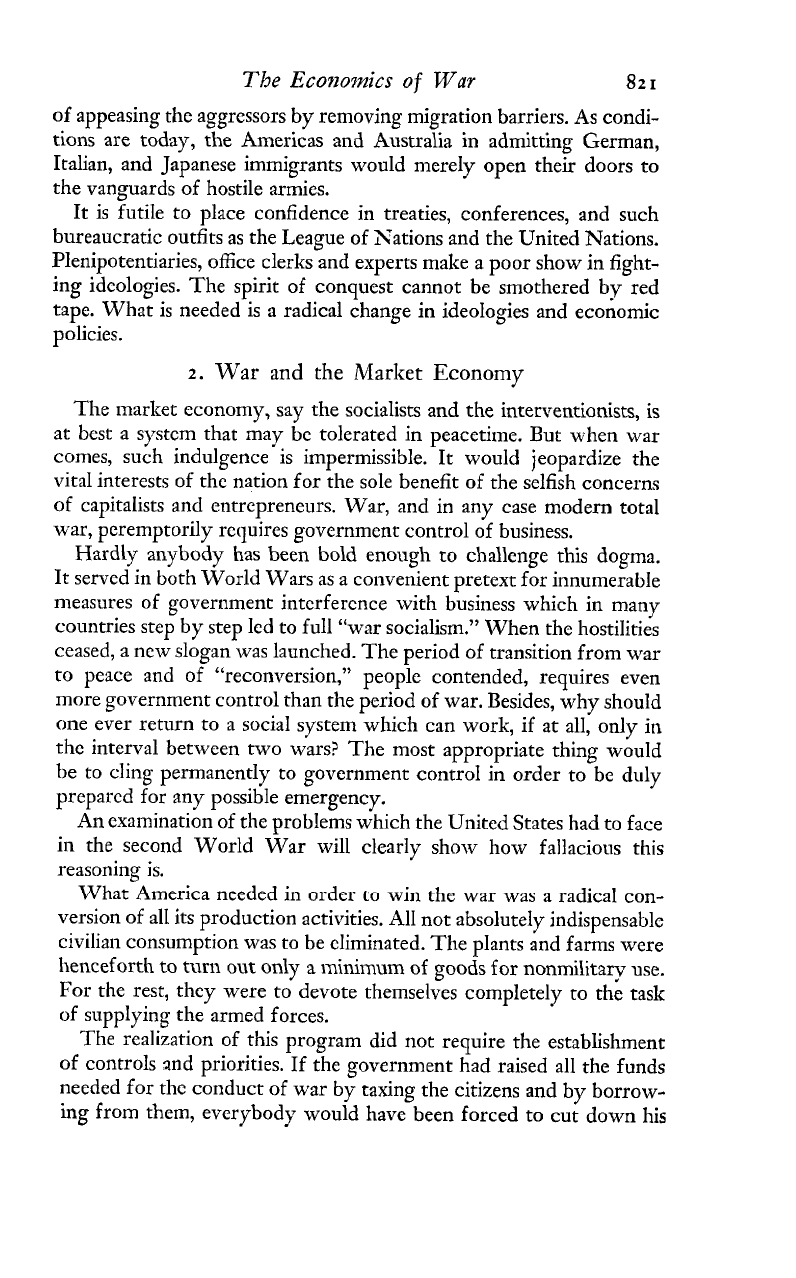
The
Economics
of
War
82
I
of appeasing the aggressors by removing migration barriers. As condi-
tions are today, the Americas and Australia
in
admitting German,
Italian, and Japanese immigrants would merely open their doors to
the vanguards of hostile armies.
It is futile to place confidence in treaties, conferences, and such
bureaucratic outfits as the League of Xations and the United Nations.
Plenipotentiaries, office clerks and experts make a poor show in fight-
ing idcologjes. The spirit of conquest cannot be smothered by red
tape. What is needed is a radical change
in
ideologies and economic
policies.
2.
War and the Market Economy
The
market economy, say the socialists and the interventionists,
is
at best a system that may be tolerated in peacetime. But when war
comes, such indulgence is impermissible. It would jeopardize the
vital interests of the nation for the sole benefit of the selfish concerns
of capitalists and entrepreneurs. War, and in any case modern total
war, peremptorily rcquires government control of business.
Hardly anybody has been bold enough to challenge this dogma.
It served in both World Wars as a convenient pretext
for
innumerable
measures of government intcrfercnce with business which in many
countries step by step led to full "war socialism." When the hostilities
ceased, a new slogan was launched. The period of transition from war
to peace and of "reconversion," people contended, requires even
more government control than the period of war. Besides, why should
one ever return to a social system which can work, if at all, only in
the interval between two wars? The most appropriate thing would
be to cling permancntly to government controI in order to be duly
preparcd for any possible emergency.
An examination of the problems which the United States had to face
in the second World War will clearly show how fallacious this
reasoning is.
What America needed in order to win
the
war
was a radical con-
version of a11 its production activities. A11 not absolutely indispensable
civilian consumption was to be climinated. The plants and farms were
henceforth to turn out only
a
miniinurn
of goods for nonmilitary use.
For the rest, they were to devote themselves completely to the task
of
supplying the armed forces.
The
realization
of this program did not require the establishment
of controls and priorities. If the government had raised all the funds
needed for thc conduct of war by taxing the citizens and by borrow-
ing from them, everybody would have been forced to cut down his
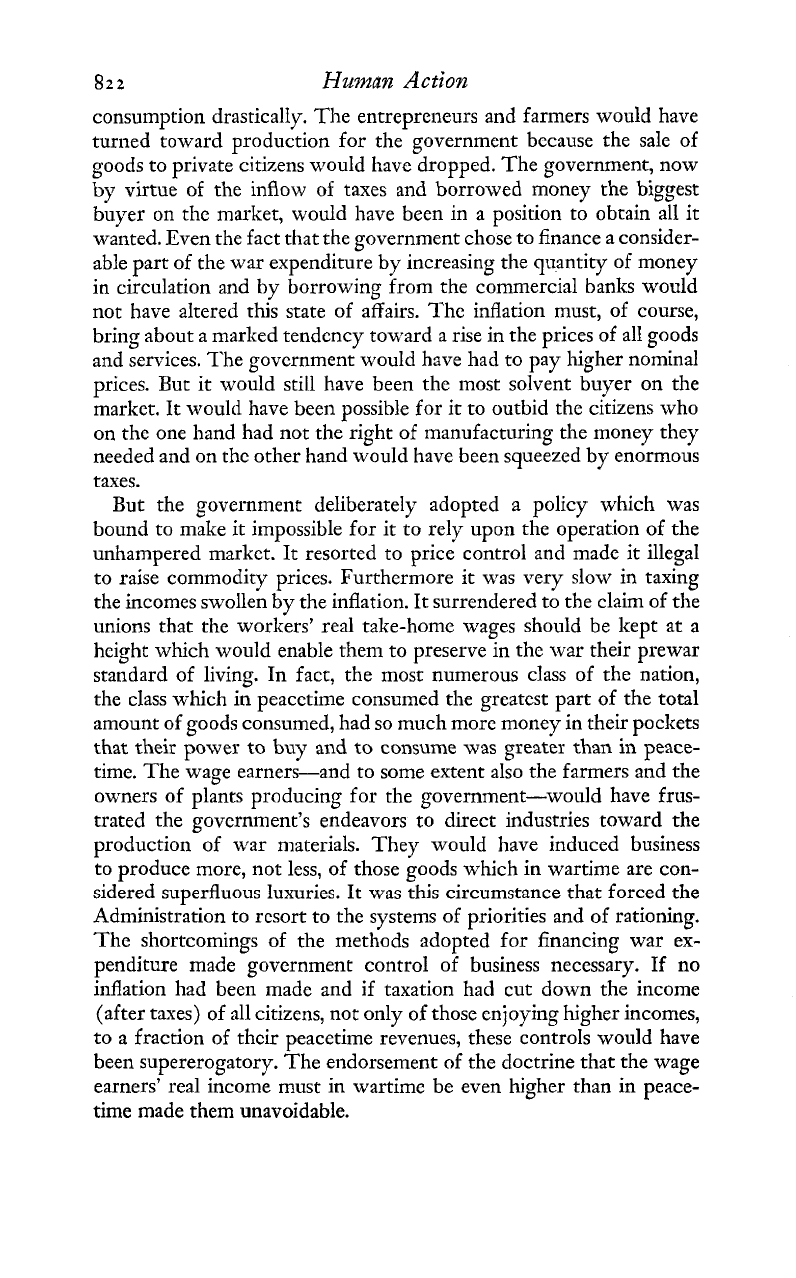
822
Human
Action
consumption drasticalIy. The entrepreneurs and farmers would have
turned toward production for the government bccause the sale of
goods to private citizens would have dropped. The government, now
by
virtue of the inflow of taxes and borrowed money the biggest
buyer on the market, would have been in a position to obtain all it
wanted. Even the fact that the government chose to finance a consider-
able part of the war expenditure by increasing the quantity of money
in circulation
and
by borrowing from the commercial banks would
not have altered this state of affairs. The inflation must, of course,
bring about a marked tendency toward a rise in the prices of all goods
and services. The government would have had to pay higher nominal
prices. But it would still have been the most solvent buyer on the
markct. It would have been possible for it to outbid the citizens who
on the one hand had not the right of manufacturing the money they
needed and on the other hand would have been squeezed by enormous
taxes.
But the government deliberately adopted a policy which was
bound to make it impossible for it to rely upon the operation of the
unhampered market. It resorted to price control and made it illegal
to raise commodity prices. Furthermore it was very slow in taxing
the incomes swollen by the inflation. It surrendered to the claim of the
unions that the workers' real take-home wages should be kept at a
height which would enable them to preserve in thc war their prewar
standard of living. In fact, the most numerous class of the nation,
the class which in peacetime consumed the greatest part of the total
amount of goods consumed, had so much more money in their pockets
that their power to buy and to consume was greater
than
in
peace-
time. The wage earners-and to some extent also the farmers and the
owners of plants producing for the government-would have frus-
trated the government's endeavors to direct industries toward the
production of war materials. They would have induced business
to produce more, not less, of those goods which in wartime are con-
sidered superfluous luxuries. It was this circumstance that forced the
Administration to resort to the systems of priorities and of rationing.
The shortcomings of the methods adopted for financing war ex-
penditure made government control of business necessary. If no
inflation had been made and if taxation had cut down the income
(after taxes) of all citizens, not only of those enjoying higher incomes,
to a fraction of their peacetime revenues, these controls would have
been supererogatory. The endorsement of the doctrine that the wage
earners' real income must in wartime be even higher than in peace-
time made them unavoidable.

The
Economics
of
War
823
Not government decrees and the paper work of hosts of people on
the government's payroll, but the efforts of private enterprise pro-
duced those goods which enablcd the American armed forces to win
the war and to provide all the ~naterial equipment its allies needed for
their cooperation. The economist does not infer anything from these
historical facts. But it is expedient to mention them as the interven-
tionists would have us believe that a decree prohibiting the employ-
ment of steel for the construction of apartment houses automatically
produces airplanes and battleships.
The adjustment of production activities to
a
change in the demand
of consumers is the source of profits. The greater the discrepancy
between the previous state of production activities and that agreeing
with the new structure of demand, the greater adjustments are re-
quired and the greater profits are earned by those who succeed best
in accomplishing these adjustments. The sudden transition from peace
to war revolutionizes the structure of the market, makes radical re-
adjustments indispensable and thus becomes for many a source of
high profits. The planners and interventionists regard such profits
as a scandal. As they see it, the first duty of government in time of
war is to prevent the emergence of new millionaires. It is, they say,
unfair to let some people become richer while other people are killed
or maimed.
Nothing is fair in war. It is not just that God is for the big battalions
and that those who are better equipped defeat poorly equipped ad-
versaries. It is not just that those in the front line shed their life-blood
in obscurity, while the commanders, comfortably located in head-
quarters hundreds of miles behind the trenches, gain glory and fame.
It is not just that John is killed and Mark crippled for the rest of his
life, while Paul returns home safe and sound and enjoys all the
privileges accorded to veterans.
It may be admitted that it is not "fair" that war enhances the
profits of those entrepreneurs who contribute best to the equipment
of the fighting forces. But it would be foolish to deny that the profit
system produces the best weapons. It was not socialist Russia that
aided capitalist America with lend-lease; the Russians were lamentably
defeated before American-made bombs fell on Germany and before
they got the arms manufactured by American big business. The most
important thing in war is not to avoid the emergence of high profits,
but to give the best equipment to one's own country's soldiers and
sailors. The worst enemies of a nation are those malicious demagogues
who would give their envy precedence over the vital interests of their
nation's cause.
